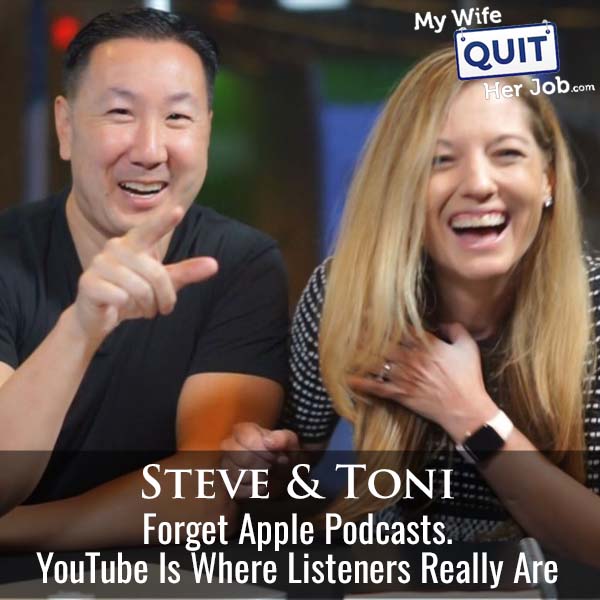609: Forget ple Podcasts. This Is Where Listeners Really Are

```html YouTube Surpasses Apple Podcasts, Spotify as Preferred Platform for Podcast Consumption
In a significant shift in audio content consumption, YouTube has emerged as the leading platform for podcasts, surpassing long-time industry giants Apple Podcasts and Spotify. This trend, driven by technological advancements and evolving listener habits, presents both opportunities and challenges for content creators.
The Rise of Video Podcasting
According to Steve Chou, founder of MyWifeQuitHerJob.com and host of the "My Wife Quit Her Job" podcast, YouTube's dominance is reshaping the podcasting landscape. "Video is quickly becoming the default for podcast consumption," Chou stated in a recent podcast episode. "Creators who adapt are pulling ahead."
Chou's observations are supported by recent data indicating a surge in podcast listenership on YouTube. This shift is attributed to several factors, including the increasing prevalence of smart TVs with integrated YouTube apps, the growing popularity of YouTube TV as a cable alternative, and seamless integration of shopping features within the YouTube ecosystem.
Technological Advancements Fueling the Trend
The convenience of accessing podcasts on television screens, coupled with the ability to engage with video content, has contributed significantly to YouTube's rise. Tony Chou, co-host of the podcast, highlighted the impact of technological advancements. "YouTube is just another channel to watch," she explained. "The technology has made it so that this is sort of an inevitable situation."
The ability to seamlessly transition from watching traditional TV to consuming podcast content on YouTube, all within the same platform, has proven to be a compelling draw for audiences.
Expert Analysis: The Impact on Content Creators
Industry analyst Sarah Evans, a digital media consultant specializing in audio content, believes this trend necessitates a strategic shift for podcasters. "Podcasters who ignore YouTube's potential are leaving money on the table," Evans argues. "Optimizing content for video, leveraging YouTube's discovery algorithms, and engaging with viewers through comments and community features are crucial for success in this evolving landscape."
However, Evans also cautions against a one-size-fits-all approach. "Simply uploading audio podcasts to YouTube without any visual elements is unlikely to yield significant results," she warns. "Successful video podcasts often incorporate engaging visuals, such as interviews, demonstrations, or animated segments, to enhance the viewing experience."
Historical Context: The Evolution of Podcasting
The podcasting industry has undergone a significant transformation since its inception in the early 2000s. Initially, podcasts were primarily distributed through RSS feeds and consumed on portable audio players like the iPod. Apple Podcasts quickly emerged as a dominant platform, providing a centralized directory and distribution network for podcasters.
Spotify's entry into the podcasting market in recent years brought increased competition and innovation. The platform invested heavily in original podcast content and introduced features such as personalized recommendations and exclusive shows. However, YouTube's emergence as a podcasting powerhouse has disrupted the established order, challenging the dominance of Apple Podcasts and Spotify.
Challenges and Opportunities for Podcasters
The shift towards video podcasting presents both challenges and opportunities for content creators. While creating video content can be more time-consuming and expensive than producing audio-only podcasts, it also offers the potential to reach a wider audience and generate new revenue streams through advertising, sponsorships, and merchandise sales.
Steve Chou acknowledges the challenges of adapting to the video format. "I forgot how painful it is," Chou said, referring to the process of building a YouTube channel from scratch. However, he also recognizes the immense potential of the platform. "With YouTube, it's kind of like starting a YouTube channel from scratch," he explained. "Which it feels like right now."
Key Takeaways for Podcasters:
Optimize content for video to enhance the viewing experience. Leverage YouTube's discovery algorithms to reach a wider audience. Engage with viewers through comments and community features. Consider creating short-form video clips for platforms like TikTok and YouTube Shorts. Monitor audience analytics to understand viewer preferences and optimize content accordingly.
The future of podcasting appears to be inextricably linked to video. As YouTube continues to innovate and expand its podcasting capabilities, content creators who embrace the video format will be best positioned to thrive in this dynamic and evolving landscape. ```
Originally sourced from: WifeQuitHer Job
